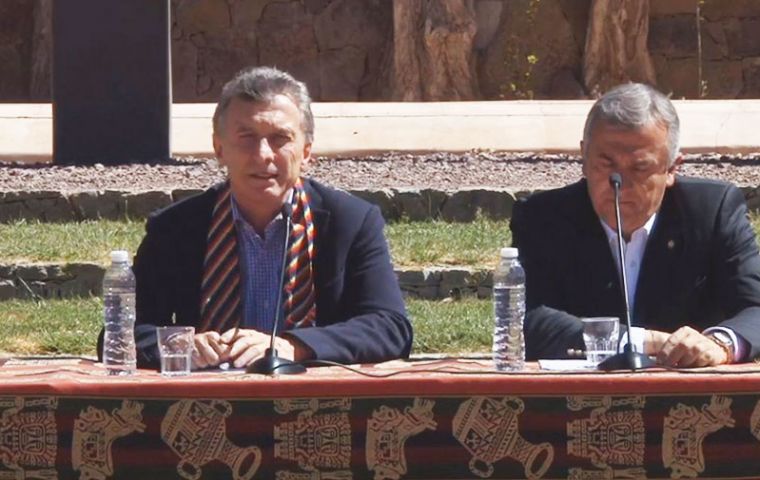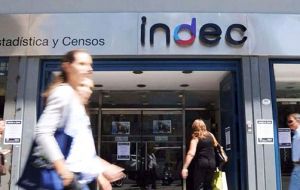MercoPress. South Atlantic News Agency
Macri anticipates more Argentines will fall into poverty this year
 “This devaluation brought a rebound in inflation, and inflation is the largest driver of poverty, and regrettably, we are going to lose some of the gains”, Macri said
“This devaluation brought a rebound in inflation, and inflation is the largest driver of poverty, and regrettably, we are going to lose some of the gains”, Macri said  Poverty in Argentina decreased last year to 25.7% from 30.3% in 2016, according to Argentina's official statistics agency, Indec.
Poverty in Argentina decreased last year to 25.7% from 30.3% in 2016, according to Argentina's official statistics agency, Indec. More Argentines are likely living in poverty now compared with last year, President Mauricio Macri said on Friday, as the country's economy slides toward recession following a currency crisis and a severe drought that harmed farm output.
Argentina's economy has taken a beating in 2018 after the run on the peso currency prompted the government to secure a US$ 50 billion credit line from the International Monetary Fund. The peso touched record lows again this month as investors fled emerging market assets due to concerns about Turkey's economy.
“This devaluation brought a rebound in inflation, and inflation is the largest driver of poverty, and regrettably, we are going to lose some of the gains we have made in poverty reduction,” Macri told a news conference in the northwestern province of Jujuy.
Argentina's 12-month inflation rate was 31.2% in July.
Poverty in Argentina decreased last year to 25.7% from 30.3% in 2016, according to Argentina's official statistics agency, Indec.
Indec is expected to publish statistics on poverty for the first half of 2018 at the end of September. The Argentine Observatory of Social Debt, a think tank affiliated with Argentina's Catholic University said last month it expects a 2-3 percentage points increase in poverty rates in 2018.
Economists expect the economy to contract 0.3% this year and grow 1.5% next year, according to the most recent central bank survey.
“Next year the economy will grow,” Macri said. “Not much, but it will grow.”
Macri's government began publishing poverty statistics in 2016 in a reversal from the former populist government, which stopped publishing poverty rates in 2013. At the time, the government said just 5% of Argentines lived in poverty, “a rate lower than Germany's”




Top Comments
Disclaimer & comment rules-

-

-

Read all commentsEM - The economic crisis was caused by the previous government which left a budget deficit of 7% of GDP, no reserves in the Central Bank, double-digit inflation, the worst international relationships since the time of the military regime, default and unpaid international court sentences against the country for stiffing bondholders and expropiating an oil company. This bears repeating because no matter how much you spin it, Cristina Kirchner is responsible for leading the most corrupt government in the history of Argentine democracy. Without even considering the corruption scandals, the macroeconomic numbers she left alone would be considered a proper reason for impeachment and jailtime in any modern democracy. And this is coming from an Argentine living in Argentina, not someone preaching left-wing ideology while sitting comfortably in free market Canada.
Aug 19th, 2018 - 02:54 am +3Reekie,
Aug 20th, 2018 - 05:50 pm +3“However, 32 months later, the Argentine economy hasn’t improved a single bit. In fact, it has become way worse.”
This is an often repeated claim of yours which I have checked using https://tradingeconomics.com/argentina/indicators and, as always, your claims are not fully supported by the statistics. If I just compare the curves at (Jan) 2016 and 2018 I see:
- GDP growth rate: Growth from minus 1% to a fairly steady plus 1%. This is an improvement.
- Unemployment: 7.5% on both dates but oscillating wildly, probably due to seasonal effects. I'll call this no change.
- Inflation rate: 30% to 25% - an apparent improvement, although the curve looks crazy.
- Interest rate: 35% to 28%, so it was reducing although it has subsequently increased.
- GDP (constant prices): US$b690 to US$b720 - an improvement.
So, to me (and I am not an economist) it actually looks like a weak recovery. You can cherry pick the data, or you can lie about the data but either way I do not believe that the data supports your claim that the economy “hasn’t improved a single bit”.
Torvarich Enrique and his leftist friends try to convince us with such stupidity to scrupulously wash the disgusting corruption of Cristina's legacy.
Aug 18th, 2018 - 04:17 pm +1Commenting for this story is now closed.
If you have a Facebook account, become a fan and comment on our Facebook Page!